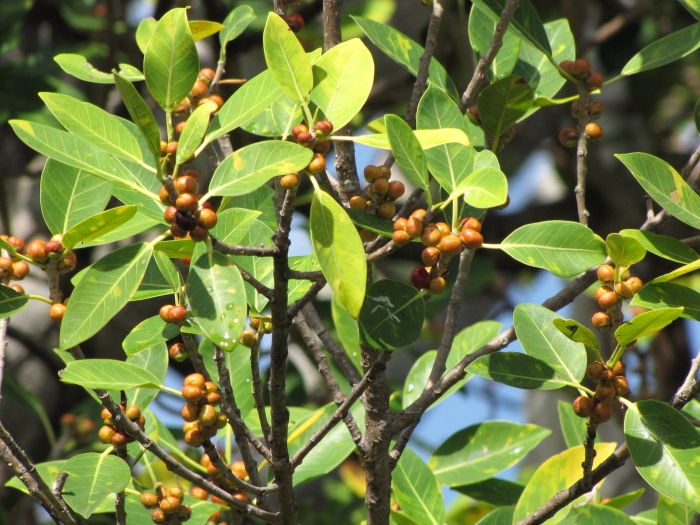Strangler Fig
(Ficus aurea)
Strangler Fig (Ficus aurea)
/
/

Forest and Kim Starr
CC BY 2.0
Image By:
Forest and Kim Starr
Recorded By:
Copyright:
CC BY 2.0
Copyright Notice:
Photo by: Forest and Kim Starr | License Type: CC BY 2.0 | License URL: https://creativecommons.org/licenses/by/2.0/ | Uploader: Starr Environmental | Publisher: Flickr |

























































Estimated Native Range
Summary
Ficus aurea, commonly known as Strangler Fig, is an evergreen tree that can also grow as a shrub or vine. It is native to tropical hammocks, limestone outcrops, and coastal swamps in Florida, Mexico, Central America, and the Caribbean. Its unique life cycle begins with seed germination in the canopy of a host tree, where it lives as an epiphyte until its roots reach the ground. Over time, it envelops and strangles the host, eventually becoming a standalone tree. Mature individuals can reach up to 30 meters (100 feet) in height. The Strangler Fig is characterized by its glossy leaves and paired figs that start green and turn yellow as they ripen. It is a fast-growing species with a broad, spreading canopy.
The Strangler Fig is valued for its striking appearance and adaptability, making it popular as an ornamental tree in large spaces, as an indoor tree, and in bonsai form. Its dense foliage and fruit provide food and habitat for wildlife. However, its vigorous growth and strong roots can cause problems when planted near buildings or walkways. It thrives in a range of light conditions from full sun to full shade and prefers medium-drained soils. While it can tolerate low to medium water availability, it performs best with consistent moisture. Gardeners should be cautious of its potential to become invasive, particularly in regions with similar climates to its native habitat.CC BY-SA 4.0
The Strangler Fig is valued for its striking appearance and adaptability, making it popular as an ornamental tree in large spaces, as an indoor tree, and in bonsai form. Its dense foliage and fruit provide food and habitat for wildlife. However, its vigorous growth and strong roots can cause problems when planted near buildings or walkways. It thrives in a range of light conditions from full sun to full shade and prefers medium-drained soils. While it can tolerate low to medium water availability, it performs best with consistent moisture. Gardeners should be cautious of its potential to become invasive, particularly in regions with similar climates to its native habitat.CC BY-SA 4.0
Plant Description
- Plant Type: Tree
- Height: 50-60 feet
- Width: 50-70 feet
- Growth Rate: Rapid
- Flower Color: N/A
- Flowering Season: Spring, Summer
- Leaf Retention: Evergreen
Growth Requirements
- Sun: Full Sun, Part Shade, Full Shade
- Water: Medium
- Drainage: Medium
Common Uses
Bird Garden, Butterfly Garden, Drought Tolerant, Salt Tolerant
Natural Habitat
native to tropical hammocks, limestone outcrops, and coastal swamps in Florida, Mexico, Central America, and the Caribbean
Other Names
Common Names: Florida Strangler Fig, Florida Strangler, Golden Fig, Higuerón, Gyllenfikus, Figuier, Figuier Blanc, Golden Wild Fig, Higo Cimarron, Higon
Scientific Names: , Ficus aurea, Ficus tuerckheimii, Ficus jimenezii, Ficus isophlebia, Ficus cookii, Ficus tecolutensis, Ficus laterisyce, Ficus sapotifolia, Ficus lundellii
GBIF Accepted Name: Ficus aurea Nutt.